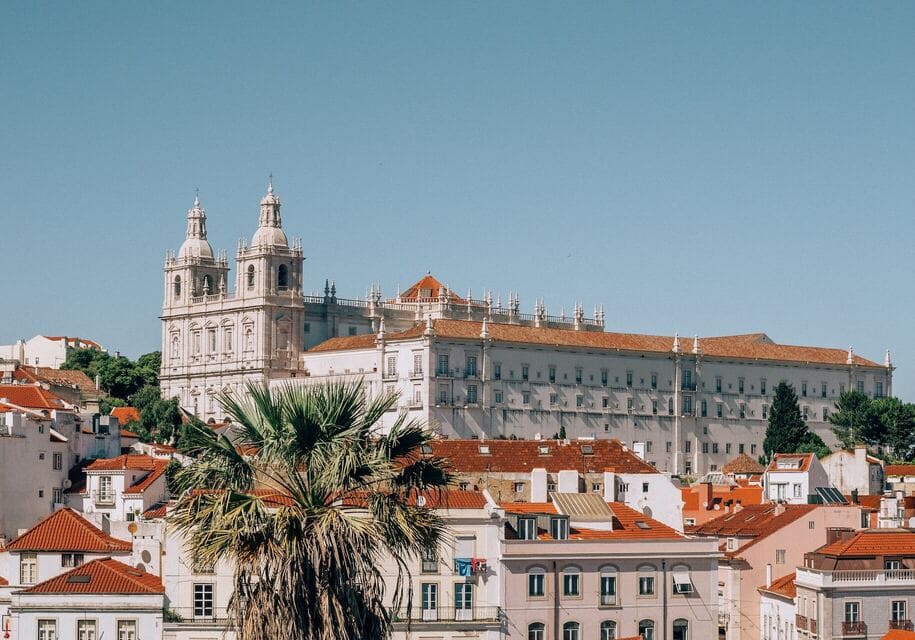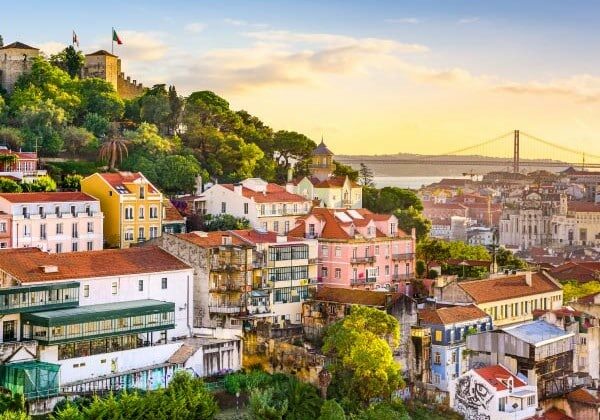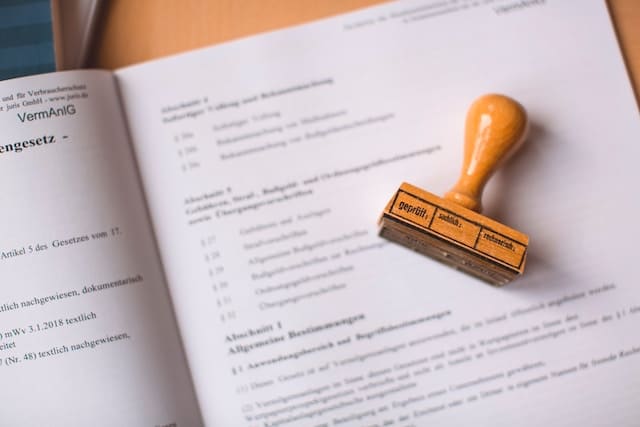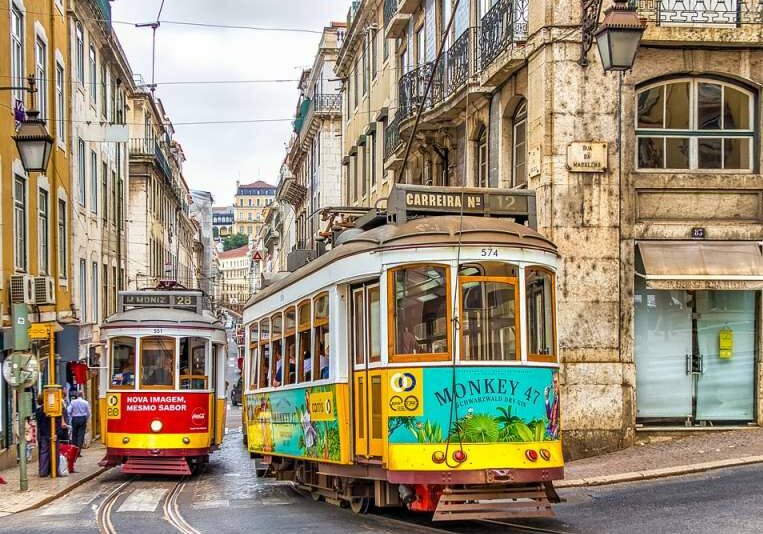If you plan on going to Portugal for the mild climate, relaxed lifestyle, and rich history but also to live and work long-term, you’ll need to apply for a visa if you are a non-EU citizen.
A Portugal residency visa (as opposed to a short-stay visa) is the first step in a lengthy process and is issued by a Portuguese consulate or embassy in your home country. It allows you to enter Portugal with the intent to apply for a residency permit, which lets you stay in the country long-term.
Typically valid for four months and permitting two entries, it provides sufficient time to enter Portugal and initiate the residency permit application process. Portugal offers various visa options to suit different needs—from digital nomads and investors to retirees and entrepreneurs.
In this article, we’ll cover everything you need about Portugal’s residency visas, helping you find the best fit for your move.
You’ll also find out more about:
Who needs a Portugal residency visa?

Portugal is part of the Schengen Area, which allows tourists and business visitors from many countries to stay up to 90 days within any 180-day period without a residency visa.
But even if you don’t need a visa for short tourist or business trips (for example, US and UK passport holders), you must still get a residency visa to remain longer or establish residence.
However, Portugal recently introduced new measures that benefit certain nationals of Portuguese-speaking countries. Under a 2022/2023 legal change aligned with the Community of Portuguese Language Countries (CPLP) agreement, citizens of Brazil and Timor-Leste gained a streamlined path to residency.
Brazilians and Timorese (who can enter Portugal as tourists without a visa) are now allowed to apply for a residence permit from within Portugal, effectively bypassing the need for a pre-entry residency visa.
Good to Know: A residency visa and a residency permit serve different purposes. A residency visa is an entry document that allows you to travel to Portugal with the intent to stay long-term. Once in Portugal, you must apply for a residency permit, which legally allows you to live in the country for an extended period. Essentially, the visa gets you into Portugal, while the permit lets you stay. |
Even though EU citizens don’t need a residency visa for stays over 90 days, there is an important formality: if you remain in Portugal for over three months, you must register your residence with the local authorities.
Residency Visa for British citizens
Since the UK is no longer part of the EU, British citizens now fall under non-EU visa requirements for extended stays. However, the European Union Withdrawal Agreement ensured that British citizens who were lawfully residing in Portugal before the end of the Brexit transition period (December 31, 2020) retain their residency rights.
Before the end of 2020’s deadline, the Portuguese government required eligible residents to register their residency status. This involved applying for a new residency document through Portuguese authorities. The agreement guarantees that these residents will continue to benefit from equal treatment in areas like healthcare, social security, and employment rights.
Types of Portugal Residency Visas
D2 – Entrepreneur Visa
The Portugal D2 Visa is a work visa designed for individuals who intend to engage in independent professional activities or plan on starting a business in Portugal. The Portuguese government introduced it to raise external resources and investments to boost the economy.
This type of visa is perfect for aspiring entrepreneurs or self-employed individuals who wish to take advantage of the growing business opportunities in Portugal.
To qualify for a D2 Visa, you must present a solid business plan for any industry that indicates how your business will contribute to the Portuguese economy. You must also demonstrate adequate financial resources in your bank account to run the business. Please note that the business should also be set up before you apply for the visa.
D3 Qualified Workers Visa
The Portugal D3 Visa is designed for highly skilled professionals such as scientists, researchers, and academics whom Portuguese institutions invite and offers employment contracts.
To be eligible for this Portuguese visa, the applicant must have a work or services contract or a promise that falls under the category of highly qualified activity. The contract must be for at least one year, and the salary depends on the applicant’s activity; usually, it must be at least 1.5 times the average gross annual salary in Portugal.
D6 Family Reunification Visa

The D6 Visa holder can partake in regular activities in Portugal, reside with family members, and work or pursue educational opportunities throughout the country. This makes the transition smoother as it allows the visa holder to fully participate in Portuguese society, contributing economically and socially to the country.
One of the significant benefits of the D6 Visa is the prospect of permanency. After residing in Portugal for five years, visa holders can apply for permanent residency.
It’s important to note that applying for the D6 Visa and the subsequent potential for a Portugal residence permit involves an in-depth process. Applicants must show financial capacity to provide and provide evidence of their direct ascendant or family relationship, such as marriage or birth certificates.
D7 Retirement Visa
The Portugal D7 Visa, also known as the Portugal Retirement Visa or the Passive Income Visa, is an excellent option for individuals with a consistent income source from properties, financial investments, or pensions. This visa is perfect for individuals who do not need to work in Portugal but wish to live there.
D7 applicants must demonstrate a stable and regular source of income from pensions, property rentals, interest income, or financial investments to support their stay in Portugal.
The income in your Portuguese bank account should be sufficient for you and your family members. The amount should be at least equivalent to the Portuguese minimum wage, which is currently €870.00 per month (€10,440.00 per year). Eligible income sources include pensions, rental, interest, or other non-salaried sources.
The D7 benefits include visa-free access to the countries in the European Union, access to Portuguese public services, and a pathway to a Portuguese residence permit.
D8 Digital Nomad Visa
In 2022, Portugal introduced the Portugal Digital Nomad Visa, enabling remote workers to live and work from Portugal. This initiative is part of a growing global trend. Many countries now offer similar arrangements, with Portugal’s option particularly attractive.
The Portugal Digital Nomad Visa targets remote workers interested in operating from Portugal. To qualify, individuals need to earn at least four times the Portuguese minimum wage, roughly amounting to €3,480.00 per month.
This Digital Nomad Visa is offered in two categories: a temporary stay visa, which is valid for up to one year, and a residency permit, which is renewable for up to five years.
After five years of obtaining your residence permit, applicants can apply for permanent residency or Portuguese citizenship, provided all the necessary criteria are met. Portuguese citizenship grants individuals visa-free access and the right to live, work, and study in all European Union (EU) countries.
Portugal Golden Visa

Through the Golden Visa program, qualifying investors and their families gain the right to live, work, and study in the country. Additionally, it provides the convenience of visa-free travel to European and Schengen countries.
The investment program also presents a pathway to more permanent ties with Portugal. Qualifying investors can apply for permanent residency or even citizenship. However, they need to maintain their investment for a minimum of five years and fully comply with Portuguese immigration law and Portuguese nationality laws.
It’s important to note that the capital transfer and real estate investment options are no longer eligible for the Portugal Golden Visa program.
Foreign citizens applying for the Golden Visa program will quickly see the benefits for those seeking to establish a strong connection with Portugal through foreign investment. Golden Visa holders don’t need to pay extra taxes on income produced outside of Portugal and are not required to register as tax residents.
Study Visa
International students from outside the EU who have secured admission to a Portuguese educational institution can apply for a residence permit for study purposes. Portuguese student visas are typically categorized into three main types:
Short-term student visas
These are intended for study programs lasting up to three months. Courses fitting this category might include brief language programs or vocational training. However, only non-EU nationals need to apply. The duration of this visa is 90 days maximum within any 180 days and is not extendable, barring exceptional circumstances.
Temporary student visas
The temporary Portugal Student Visa caters to programs spanning three months to a year, including study courses, vocational training, student exchange initiatives, internships, or volunteer student work. Proof of acceptance into a study, training program, exchange, internship, or volunteer work is needed. They are usually issued for a maximum of one year.
Long-term student visas

This visa has five different categories: Higher education (covering all undergraduate and postgraduate degree courses), Researchers (scientific and academic research), Secondary school students (QNQ level 4–5), Trainees, and Student volunteers. Securing a placement at a university or educational institution in Portugal is typically required.
The legal residency permit is initially valid for one year but can be renewed every two years for up to five years. It can be extended if the course continues. Long-stay visas are generally renewable, provided the applicant fulfills Portuguese immigration requirements.
Portugal Residency Visa Requirements
The first step is to apply for your Portugal visa, which is necessary to enter the country and begin the permanent residency process. To apply, you must submit a visa application at the Portuguese Embassy or Portuguese consulate in your home country. This visa is valid for 120 days and permits double entry, which means you can travel in and out of Portugal within this period.
The documents required may vary depending on the purpose of your stay, but commonly include:
- A completed visa application form
- Your up-to-date passport or other valid travel document
- Proof of sufficient funds in your bank account to support your stay
- Proof of accommodation in Portugal, such as a lease agreement or invitation to stay letter
- Health insurance coverage
- Police clearance certificate or proof of no criminal record
Depending on your specific purpose of stay, additional documentation may be required; this includes but is not limited to, an official job contract or an enrolment letter for a Portuguese educational institution.
Benefits of the Portugal Residence Permit
Holding a Portuguese residence permit comes with a multitude of advantages that make Portugal an attractive destination for non-EU nationals, including:
- Visa-free travel: First and foremost, the permit provides unlimited access to all countries within the EEA, EU, and Schengen states. This privilege allows you to freely travel, live, and work in these countries without needing to apply for additional visas.
- Access to the workforce: The residence permit also grants non-EU nationals the right to work in Portugal. Whether you wish to be employed by a company, start your own business, or work as a freelancer, you have the same employment rights as Portuguese citizens.
- Education access: It provides access to the Portuguese education system. This includes public schools, universities, and vocational training institutions. In addition, children of permit holders have the same rights to education and schooling as Portuguese nationals.
- Healthcare: As a resident, you’ll have access to the Portuguese healthcare system, which is renowned for its high quality. Public healthcare in Portugal is free or low-cost for residents, and many excellent private healthcare options are available.
- Family reunification: The residence permit also allows you to bring over other family members through family reunification. This can include your spouse, dependent children, and dependent parents.
- Pathway to citizenship: After five years as a legal resident, you become eligible to apply for Portugal citizenship, provided you meet the requirements, and then apply for a Portuguese passport. You must pass a basic Portuguese language test for citizenship.
Applying for a Portugal Residence Permit

In many cases, especially for visas like the D8, you are required to book an appointment with AIMA Portugal within 120 days. Some consulates will schedule this first appointment for you in advance, whereas others require you to schedule it yourself upon arrival.
At this appointment, you will submit your documents, any updated information, and biometric data (fingerprints, photo, signature) for the residence card. The required documents for the residency permit application include:
- A valid passport
- Visa application form
- Valid residence visa (when applicable)
- Two recent and identical color photographs
- Evidence of sufficient financial resources to support your stay
- Proof of accommodation
- Proof of health and travel insurance
- AIMA appointment confirmation
AIMA examines your application, conducts an interview if necessary, and typically makes a decision within 90 business days. If approved, you’ll receive a residence permit card valid for two years and renewable for three years. After five years of legal residency in Portugal, you can apply for permanent residence.
Why choose Global Citizen Solutions for your Immigration Visa?
GLOBAL APPROACH BY LOCAL EXPERTS
- GCS has offices located across Portugal.
- Members of the US-Portugal and UK-Portugal Chambers of Commerce in Portugal, and the Investment Migration Council (IMC).
- Our expert team can help you throughout your journey to secure your Visa.
100% APPROVAL RATE
- Our successful track record in applications provides reassurance to applicants.
- We have helped clients from more than 35 countries secure residency in Portugal.
ALL-ENCOMPASSING SOLUTION
- With a single channel of communication, our approach ensures that you have complete clarity on your application.
- Our BeGlobal® Onboarding System allows for a total flow of information.
TRANSPARENCY AND PRIVACY
- Our pricing is clear and detailed, you will not face any hidden costs.
- All data is stored within a GDPR-compliant database on a secure SSL-encrypted server.

Frequently Asked Questions About the Portugal Residency Visa
What is a Portugal residency visa?
A Portugal residency visa allows non-EU citizens to live in Portugal for more than 90 days. Common types include the D7 visa for retirees or passive income holders and the D8 Digital Nomad visa. Applicants must show proof of income, accommodation, health insurance, and pass background checks.
What are the Portugal residency visa requirements?
To obtain a Portugal residency visa, submit a completed application, valid passport, proof of financial means, accommodation, and health insurance. Additional documents like a police clearance or employment contract may be needed.
How do I get a Portuguese residence permit?
To get a Portuguese residence permit, apply for a visa (work, student, or Golden Visa). Once approved, move to Portugal and attend your AIMA appointment with documents like your passport, income proof, and health insurance. The initial permit is valid for two years and can be renewed. After five years of legal residency, you can apply for permanent residency.
How do I obtain permanent residency in Portugal?
Permanent residence in Portugal can be obtained after maintaining legal residency in the country for at least five consecutive years. You have to meet several requirements, which one of our immigration lawyers in Portugal can explain to you.
What are the common reasons for the denial of a Portugal residency visa?
Denials often occur due to insufficient financial means, missing health insurance, or incomplete visa application documents. Failure to provide a residence certificate or meet Portuguese language requirements can also be reasons. Ensure all requirements for a temporary or permanent residence permit are met.
Can I travel within the Schengen Area with a Portugal residency visa?
Yes, with a Portugal temporary or permanent residence permit, you can travel within the Schengen Area for up to 90 days in 180. Ensure your visa application is complete and you adhere to the visa conditions. The Portuguese consulate can offer more details on travel rights.
What are the benefits of having a Portugal residency visa?
A Portugal residency visa provides a temporary residence permit, allowing you to live and work in Portugal. It can lead to a permanent residence permit and Portuguese citizenship. Benefits include Schengen Area travel. You must meet requirements like health insurance and maintaining your residence permit to become a tax resident.
Once I have a Portugal residence permit, can I apply for citizenship?
After five years of living in Portugal with a temporary residence permit, you can apply for permanent residence or Portuguese citizenship.
Naturalization can be achieved through various visas, like the Golden Visa, D7, or D8. Other routes to citizenship include marriage, investment, or being a direct descendant of a Portuguese parent. For more information, see A Guide to Portugal Citizenship.
Do I need to become a tax resident in Portugal?
Depending on your visa and residency status, you may need to become a Portuguese tax resident. If you reside in Portugal for more than 183 days or six consecutive months in a calendar year or have a permanent residence, you will be considered a Portuguese taxpayer.
What are the tax implications of having a Portugal residency visa?
With a Portugal residency visa, you may need to become a Portuguese tax resident if you stay over 183 days or hold a permanent residence permit. Comply with local tax obligations and report worldwide income. The Portuguese consulate can provide guidance. Ensure your visa application includes proof of financial means.
How much is a Portuguese residence permit?
The cost of a Portuguese residence permit varies based on the type of visa you initially apply for, but generally, the application fee ranges from €75 to €90. Temporary permits usually cost around €170, while a long-term residence permit fee is €108.
How does Brexit affect UK citizens applying for a Portugal residency visa?
Post-Brexit, UK citizens are treated as non-EU nationals in the EU. To apply for a residence permit or residency visa in Portugal, they must follow non-EU procedures.
Portugal offers various visas for UK nationals, including the D7 Visa for those with passive income and retirees. Despite the changes, Portugal remains welcoming and offers favorable conditions for UK residents looking to make it their home.
Can I obtain a Portugal residency visa through marriage?
Yes, you can obtain a Portugal residence permit through marriage. If married to a Portuguese citizen or legal resident, you may qualify for a family reunification residence permit. This permit allows you to live and work in Portugal and can lead to permanent residency and Portuguese citizenship. You’ll need to provide proof of marriage and meet specific requirements from the Portuguese immigration authorities.
How to apply for a Portugal startup visa for entrepreneurs?
Apply for a Portugal startup visa by submitting a visa application with business plans and financial proof. This visa offers a temporary residence permit, which can lead to a permanent residence permit. Include a residence certificate and show basic Portuguese language skills. The Portuguese consulate processes your application.
Can I bring my family with a Portugal residency visa?
Yes, you can bring your family with a Portugal residency visa through a process called family reunification. Spouses, dependent children, and sometimes dependent parents are eligible. You must prove your ability to financially support them, provide accommodation, and meet all visa requirements for each family member.
How much money do I need to show for a Portugal residency visa?
To get a Portugal residency visa, you must show proof of income of at least €870 per month for a single applicant. For each additional family member, add about 50% of that amount. Savings, pensions, rental income, or remote work contracts can qualify as proof of financial means.

 Foreigners must apply for a temporary residence permit after entering Portugal with a residency visa (D3, D8, D7, etc.). This official government card permit allows third-country nationals to live and work legally in Portugal.
Foreigners must apply for a temporary residence permit after entering Portugal with a residency visa (D3, D8, D7, etc.). This official government card permit allows third-country nationals to live and work legally in Portugal.
